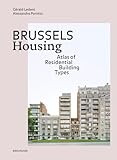Brussels Housing : Atlas of Residential Building Types / Gérald Ledent, Alessandro Porotto.
Material type: TextPublisher: Basel : Birkhäuser, [2023]Copyright date: ©2023Description: 1 online resource (352 p.)Content type:
TextPublisher: Basel : Birkhäuser, [2023]Copyright date: ©2023Description: 1 online resource (352 p.)Content type: - 9783035625509
- 9783035625530
- Art Nouveau
- Brüssel
- Maxime Delvaux
- Reihenhaus
- Reihenhäuser
- Stadtarchitektur
- Stadtgarten
- Stadthaus
- Terrace housing
- Wohnbauten
- Wohntypologie
- Wohnungsbau
- Wohnungsblock
- ARCHITECTURE / Regional
- Art Nouveau
- Brussels
- Floor plans
- Housing slabs
- Maxime Delvaux
- Terrace housing
- Town house
- Urban block
- terraced house
- traditional house
- 728.3
- online - DeGruyter
- Issued also in print.
| Item type | Current library | Call number | URL | Status | Notes | Barcode | |
|---|---|---|---|---|---|---|---|
 eBook
eBook
|
Biblioteca "Angelicum" Pont. Univ. S.Tommaso d'Aquino Nuvola online | online - DeGruyter (Browse shelf(Opens below)) | Online access | Not for loan (Accesso limitato) | Accesso per gli utenti autorizzati / Access for authorized users | (dgr)9783035625530 |
Frontmatter -- Contents -- Foreword -- Introduction. Brussels Housing: A Typology -- A City of Row Houses: From the Origins to 1914 -- Brussels Cityscapes I -- Housing Atlas I -- Perpetuating or Opposing the Terraced House -- Brussels Cityscapes II -- Housing Atlas II -- The Search for Quality Housing: From 2000 Onwards -- Brussels Cityscapes III -- Housing Atlas III -- About the Authors -- Acknowledgements -- Index -- Illustration Credits
restricted access online access with authorization star
http://purl.org/coar/access_right/c_16ec
Modern urban terraced houses or row houses emerged in Europe from the 17th century onwards. Usually two to three storeys high and with a garden at the back, they formed the traditional urban block. In Brussels, this bourgeois form of housing took on a particularly varied and inspiring form – including the well-known Art Nouveau residences – and forms the DNA of the city to this day. This publication analyses 100 selected examples illustrating the emergence of the terraced house and its further development in other forms of housing. The result is a broad panorama and a history of the architecture and development of the city of Brussels with its particularly heterogenous cityscape.
Städtische Reihenhäuser – town houses – entstanden in Europa ab dem 17. Jahrhundert. Im Regelfall zwei- bis dreigeschossig und mit einem Garten auf der Rückseite ausgestattet, bildeten sie den städtischen Block. In Brüssel hat diese bürgerliche Wohnform eine besonders vielgestaltige und bis heute inspirierende Ausformung erfahren. Diese Publikation analysiert 100 ausgewählte Beispiele dieser Typologie, zeigt aber auch ihre Weiterentwicklung in anderen Formen des Wohnungsbaus. So entstehen ein breit angelegtes Panorama sowie eine Architektur- und Entstehungsgeschichte der Stadt Brüssel.
Issued also in print.
Mode of access: Internet via World Wide Web.
In English.
Description based on online resource; title from PDF title page (publisher's Web site, viewed 06. Mrz 2024)


